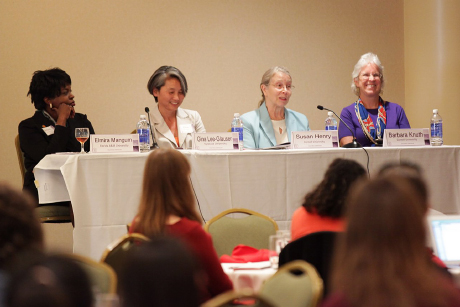Panelists discuss paths to success for women in academia
By Anne Ju

Career success can take many paths, as evidenced by four women who have earned impressive leadership credentials in academic settings. They spoke on their experiences and offered advice during a May 20 symposium for women in engineering and the sciences.
The panel was one of many featured at Cornell’s Empowering Women in Science and Engineering (EWISE) symposium centered on the theme of defining a career and pathways to leadership.
All four panelists have Ph.Ds., but that’s where the similarities ended. Susan Henry, professor of molecular biology and genetics and dean emerita of the College of Agriculture and Life Sciences (CALS), started her academic career as an assistant professor at Albert Einstein Medical College, later moving to Carnegie Mellon University before coming to Cornell as CALS dean in 2000 and serving two terms. She always knew she wanted to go back to being a professor, teaching and running a research lab.
“Think very carefully about what you think your end point is going to be. Where do you want to end up?” Henry asked.
Elmira Mangum, president of Florida A&M University and former Cornell vice president for budget and planning, received her Ph.D. midcareer, and said she struggled at times to balance work, family and career.
In her higher education administration career, navigating politics in academic settings, as well as in the broader community and at the state level, is a crucial skill to have in her line of work, she said. She urged focus on relationships and inclusive processes.
“It really is about relationships – including the faculty as much as you can, and listening,” Mangum said. “It’s not so much that they have to define what you do, but you have to hear what they say.”
For Barbara Knuth, vice provost and dean of the Cornell Graduate School and professor of natural resources, being where she is now was not what she originally intended. After finishing her Ph.D., she had wanted to become an environmental policy lobbyist in Washington, D.C., but a job she wanted badly did not pan out. The assistant professor job at Cornell did, though. When she arrived at Cornell in 1986, she joined an all-male natural resources faculty and was also the department’s youngest member.
She stressed being open to opportunities “that may not have been in your plan.”
“Sometimes it’s good to say yes,” she said.
Also participating in the panel discussion was Gina Lee-Glauser, vice president for research at Syracuse University, who shared professional and personal stories of how she got to Syracuse following a career in mechanical engineering. Her then-teenaged son urged her to apply for the Syracuse job, she said.
The panel was the day’s last. Other topics ranged from navigating STEM careers in uncertain times to learning strategies for negotiation and networking.
The EWISE symposium was supported by Diversity Programs in Engineering, the Office of Faculty Development and Diversity, the Cornell Graduate School’s Office of Inclusion and Professional Development, the President’s Council of Cornell Women and Lockheed Martin Corp.
Media Contact
Get Cornell news delivered right to your inbox.
Subscribe